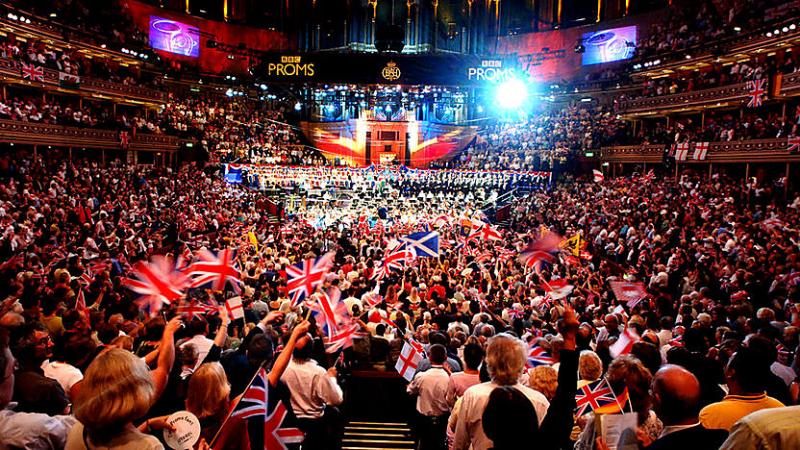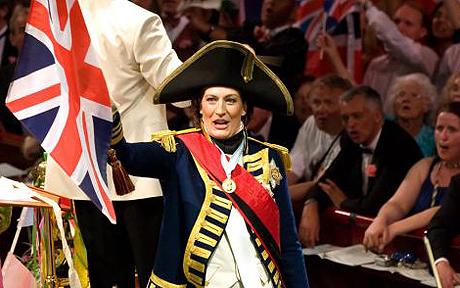The Last Night of the Proms, Connolly, Balsom, BBCSO, Robertson | reviews, news & interviews
The Last Night of the Proms, Connolly, Balsom, BBCSO, Robertson
The Last Night of the Proms, Connolly, Balsom, BBCSO, Robertson
A night of humour, emotion and revelation

The height of naffness? The best of British? A bit of fun? Opinions always splinter over the Last Night of the Proms. The received wisdom is that, if you have a brain or any genuine care for music, you’re not really meant to enjoy the Last Night; you’re meant to endure it, bravely, stoically, heroically, like a terminal illness, by taking each sonic and visual blow on the chin.
Things began before they'd begun. Conductor David Robertson had barely lifted his baton when a balloon started to whizz and fizz its way up towards the acoustical lily pads, as if making a last-ditch attempt to be accepted into Oliver Knussen’s Flourish for Fireworks that opened the evening. It was a decentish impression of a firework – for a balloon - immediately outclassed by Knussen’s own. His piece brilliantly captured the delicately ephemeral but excitable nature of a pyrotechnical display. It was music that appeared to travel both everywhere and nowhere, very satisfyingly, in a very short space of time.
From here we entered the much less sophisticated world of Purcell as reimagined by Henry Wood. A pretty unimaginative and four-square rearrangement of that brilliant Baroque composer's music that, nonetheless, showed what versatile players the BBC Symphony Orchestra are, through forcing awkward chamber ensembles on certain individuals. And then we came to the meat, the emotion, Sarah Connolly, in imposing Edwardian dress, sucking us straight into the celebrated lament from Purcell’s Dido and Aeneas. It was a profoundly impressive performance, perfectly judged in ornamentation as well as line.
 A change of dress later and she was giving an equally powerful rendition of Mahler’s Lieder eines fahrenden Gesellen. In both, it wasn’t just her voice that was delivering something special but her face. However close the cameras came to examine Connolly’s face – and one could follow their beady lenses on the screens in the hall - they couldn’t catch her out. Connolly inhabits a role - whether Dido or Mahler’s traveller, or later, more jokily, Admiral Nelson in full regalia in Arne's Rule, Britannia! - like few others. Whoever she is, the psychology is entered into with unflinching conviction. The furrows on her brow in the first song of Mahler’s cycle appeared ancient; the naivety that invades her soul when she begins to sing about the birds, fresh and clean. Voice and body were always in perfect unison.
A change of dress later and she was giving an equally powerful rendition of Mahler’s Lieder eines fahrenden Gesellen. In both, it wasn’t just her voice that was delivering something special but her face. However close the cameras came to examine Connolly’s face – and one could follow their beady lenses on the screens in the hall - they couldn’t catch her out. Connolly inhabits a role - whether Dido or Mahler’s traveller, or later, more jokily, Admiral Nelson in full regalia in Arne's Rule, Britannia! - like few others. Whoever she is, the psychology is entered into with unflinching conviction. The furrows on her brow in the first song of Mahler’s cycle appeared ancient; the naivety that invades her soul when she begins to sing about the birds, fresh and clean. Voice and body were always in perfect unison.
Comedy came with Sir Malcolm Arnold’s A Grand, Grand Overture for three Hoovers (performed by conductor Jiri Belohlavek, violinist Jennifer Pike and pianist Stephen Hough) one floor polisher (Sir David Attenborough) and four rifles (Goldie, Martha Kearney, Rory Bremner and double-bassist Chi-Chi Nwanoku). Belohlavek and Pike began to give the Hoovers a bit of vibrato; Attenborough messed up the recapitulation, bringing the floor polisher in too early. What was, however, most funny about these near-authentic 1970s (at a guess) beige Hoovers was the subtlety of their sound. They were rather delicate little things that really did seem to need some musical coaxing.
And the musical revelation for me appeared in the shape of Heitor Villa-Lobos’s Choros No 10, Rasga o coracao, from 1926. What an extraordinary piece it is, journeying from the edges of sonic respectability, from the rusty honks and hoots of Varese, through to the sharp syncopations, melodious layering, and bells and whistles of a Brazilian carnival. It is a great testament to his skill that Villa-Lobos managed to marry so much diverse material with such clarity and force.
The rest of the programme tootled along as you might expect, the audience a bit confused by the serious music, much happier with the school assembly sing-songs, and happier still with the peroxide-blonde trumpeter babe, Alison Balsom, whose every appearance they greeted with a game show "Oooooo!" There was only one real clanger - a specially commissioned clanger - Sarah Connolly scatting to an arrangement of Gershwin’s Shall We Dance, of which the less is said the better.
Explore topics
Share this article
The future of Arts Journalism
You can stop theartsdesk.com closing!
We urgently need financing to survive. Our fundraising drive has thus far raised £49,000 but we need to reach £100,000 or we will be forced to close. Please contribute here: https://gofund.me/c3f6033d
And if you can forward this information to anyone who might assist, we’d be grateful.

Subscribe to theartsdesk.com
Thank you for continuing to read our work on theartsdesk.com. For unlimited access to every article in its entirety, including our archive of more than 15,000 pieces, we're asking for £5 per month or £40 per year. We feel it's a very good deal, and hope you do too.
To take a subscription now simply click here.
And if you're looking for that extra gift for a friend or family member, why not treat them to a theartsdesk.com gift subscription?
more Classical music
 BBC Proms: Ehnes, Sinfonia of London, Wilson review - aspects of love
Sensuous Ravel, and bittersweet Bernstein, on an amorous evening
BBC Proms: Ehnes, Sinfonia of London, Wilson review - aspects of love
Sensuous Ravel, and bittersweet Bernstein, on an amorous evening
 Presteigne Festival 2025 review - new music is centre stage in the Welsh Marches
Music by 30 living composers, with Eleanor Alberga topping the bill
Presteigne Festival 2025 review - new music is centre stage in the Welsh Marches
Music by 30 living composers, with Eleanor Alberga topping the bill
 Lammermuir Festival 2025 review - music with soul from the heart of East Lothian
Baroque splendour, and chamber-ensemble drama, amid history-haunted lands
Lammermuir Festival 2025 review - music with soul from the heart of East Lothian
Baroque splendour, and chamber-ensemble drama, amid history-haunted lands
 BBC Proms: Steinbacher, RPO, Petrenko / Sternath, BBCSO, Oramo review - double-bill mixed bag
Young pianist shines in Grieg but Bliss’s portentous cantata disappoints
BBC Proms: Steinbacher, RPO, Petrenko / Sternath, BBCSO, Oramo review - double-bill mixed bag
Young pianist shines in Grieg but Bliss’s portentous cantata disappoints
 theartsdesk at the Lahti Sibelius Festival - early epics by the Finnish master in context
Finnish heroes meet their Austro-German counterparts in breathtaking interpretations
theartsdesk at the Lahti Sibelius Festival - early epics by the Finnish master in context
Finnish heroes meet their Austro-German counterparts in breathtaking interpretations
 Classical CDs: Sleigh rides, pancakes and cigars
Two big boxes, plus new music for brass and a pair of clarinet concertos
Classical CDs: Sleigh rides, pancakes and cigars
Two big boxes, plus new music for brass and a pair of clarinet concertos
 Waley-Cohen, Manchester Camerata, Pether, Whitworth Art Gallery, Manchester review - premiere of no ordinary violin concerto
Images of maternal care inspired by Hepworth and played in a gallery setting
Waley-Cohen, Manchester Camerata, Pether, Whitworth Art Gallery, Manchester review - premiere of no ordinary violin concerto
Images of maternal care inspired by Hepworth and played in a gallery setting
 BBC Proms: Barruk, Norwegian Chamber Orchestra, Kuusisto review - vague incantations, precise laments
First-half mix of Sámi songs and string things falters, but Shostakovich scours the soul
BBC Proms: Barruk, Norwegian Chamber Orchestra, Kuusisto review - vague incantations, precise laments
First-half mix of Sámi songs and string things falters, but Shostakovich scours the soul
 BBC Proms: Alexander’s Feast, Irish Baroque Orchestra, Whelan review - rapturous Handel fills the space
Pure joy, with a touch of introspection, from a great ensemble and three superb soloists
BBC Proms: Alexander’s Feast, Irish Baroque Orchestra, Whelan review - rapturous Handel fills the space
Pure joy, with a touch of introspection, from a great ensemble and three superb soloists
 BBC Proms: Moore, LSO, Bancroft review - the freshness of morning wind and brass
English concert band music...and an outlier
BBC Proms: Moore, LSO, Bancroft review - the freshness of morning wind and brass
English concert band music...and an outlier
 Willis-Sørensen, Ukrainian Freedom Orchestra, Wilson, Cadogan Hall review - romantic resilience
Passion, and polish, from Kyiv's musical warriors
Willis-Sørensen, Ukrainian Freedom Orchestra, Wilson, Cadogan Hall review - romantic resilience
Passion, and polish, from Kyiv's musical warriors
 BBC Proms: Faust, Gewandhausorchester Leipzig, Nelsons review - grace, then grandeur
A great fiddler lightens a dense orchestral palette
BBC Proms: Faust, Gewandhausorchester Leipzig, Nelsons review - grace, then grandeur
A great fiddler lightens a dense orchestral palette

Add comment